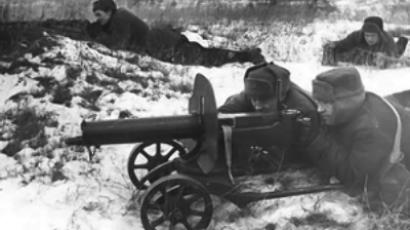WWII hero awarded on Fatherland Day
After waiting for almost a lifetime, Nikolay Novikov, a Russian WWII hero, has received official recognition of his services to the military. He received his award as Russia celebrates Defenders of the Fatherland Day.
It's marked in Russia on February 23 – a national holiday celebrating the country's servicemen and war veterans. All men, especially those who were or are linked to the armed forces, receive greetings and gifts from the government, their families and loved ones.
Established in the early days of the USSR, Defenders of the Fatherland Day is still commemorated in many former Soviet republics.
In Russia, it is traditional to lay flowers by the Eternal Flame, at the Tomb of the Unknown Soldier just outside the Kremlin.
The Flame had been temporarily relocated two months ago, but returned with honors today, with President Dmitry Medvedev laying a wreath at the memorial.
Another tradition is the decoration of war veterans.
It was only last week that Nikolay Novikov found out that, back in 1943, he had been awarded an Order of the Red Star for his heroic fighting on the front line – holding off Hitler's forces during the Siege of Leningrad.
Stepping forward to proudly receive a medal from the President, he did not mind that it took a little longer than usual to attach. He had already waited more than six decades for this day.
“As our president was fastening the order to my chest, I said to him, ‘You are fastening it for so long.’ To which he replied, ‘For eternity’,” Novikov says.
Over the course of the 900-day resistance, over 600,000 people are thought to have died in the city from cold, famine and the constant and devastating air raids.
“After occupying the enemy’s battery we went ahead along the road and heard mortar fighting. We stopped and tried to guess whether they were targeting us or not… I gave a command ‘hit the deck!’ and we all threw our bodies on the ground, but I only managed to squat down. A mine exploded just a meter away and my whole body was riddled with its fragments”, Novikov remembers.
It was as he lay wounded in hospital that he was awarded the order, but the news never reached him – and he had no idea that he was to be honored as a hero. This is a similar scenario for many war veterans.
“During the war it was often the case that a person earned an award, but then a couple of days later they were wounded and sent to the medical battalion. But they were often assigned to a different military unit after the injury and never received their awards”, historian Yuri Nikifirov explains.
There are still over half a million veterans who have not received their awards, and for the soldiers and their families it is an important recognition of the bravery of the men who fought so hard for their country.
A state commission searches for the unawarded veterans using the help of volunteers, whose aim is to revive more success stories like Nikolay’s.













